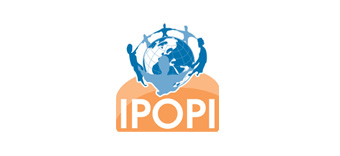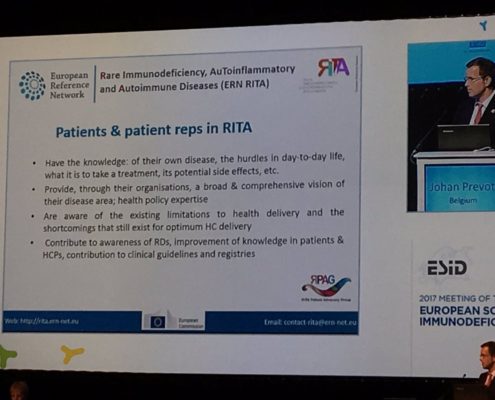October 13, 2017
ERN-RITA meets in Edinburgh
IPOPI was pleased to actively participate in the Meeting of the European Reference Network on immunodeficiency, autoinflammatory and autoimmune diseases (ERN-RITA) held in Edinburgh on September 12 and held back to back with the Annual Meeting of the European Society for Immunodeficiencies (ESID).
This was the first general meeting of ERN-RITA and Johan Prevot, IPOPI’s Executive Director was among the panel of speakers of the opening session along with the other RITA Board members, Dr Enrique Terol from the European Commission (DG Sante) and Dr Till Voightlander from the ERN Board of Member States.
In his presentation, Dr Terol highlighted the reasons behind the creation of the European Reference Networks as well as their primary role aimed at improving quality, safety and access to highly specialised healthcare for patients living with rare or low prevalence, complex disorders. He stressed several important points:
- Many of those affected by a rare or complex condition do not have access to diagnosis and high-quality treatment.
- Expertise and specialist knowledge may be scarce because patient numbers are low
- No country alone has the knowledge and capacity to treat all rare and complex diseases.
- Important delay in diagnosis because lack of knowledge or right referral systems
- Lack of diagnostic capacity (no tests available) and treatments in many cases
Dr Terol indicated that ERNs offer the potential to give patients and doctors across the EU access to the best expertise and timely exchange of life-saving knowledge, without having to travel to another country. He also stated that ERNs are the perfect example of what solidarity can achieve in Europe. Lastly, he outlined the project implementation timeline in the five years to come.
In his presentation, Johan Prevot stressed the importance of having patient-centred European Reference Network. The European Commission envisioned that the ERNs should empower and involve patients in order to improve the safety and good quality of the care they receive. He also outlines how patients and patient group representatives can productively participate in the work of the ERNs including but not limited to the expert knowledge of their disorders, their health policy expertise and their knowledge of existing limitations to health delivery and the shortcomings that still exist for optimum HC delivery. Also stressed during the presentation was the fact that patients within the ERN-RITA are united and acting as one voice through RIPAG (RITA Patient Advocacy Group). This ensures that representatives from the different patient communities represented in ERN-RITA are in constant communication and exchange their views so as to contribute consistently in the activities of the network. The expectations of patients for ERN-RITA were summarized as follows:
- ERN-RITA will help levelling out inequalities in terms of access to treatments for our patients (guidelines)
- ERN-RITA will help increasing diagnosis rates around the EU
- ERN-RITA will help support patient registries
- ERN-RITA will promote research into our disease areas
- ERN-RITA will help connecting patients to HCPs across the network including at member state level
- ERN-RITA will tackle lack of expertise and isolation of patients, particularly in member states where RDs infrastructure is less developed
The first ERN-RITA meeting fulfilled its primary objective to inform and discuss the current status of the network and its future direction with its relevant stakeholders.
IPOPI has been involved in ERN RiTA since its inception.


